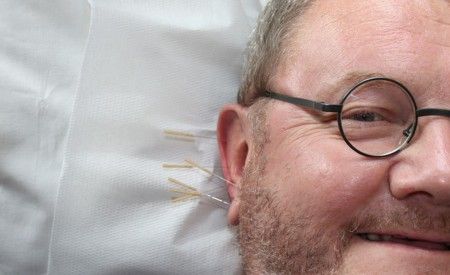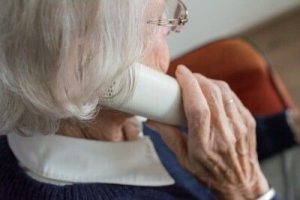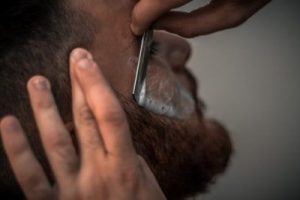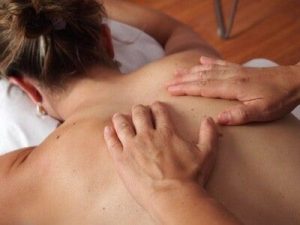Acupuncture and drug withdrawal – ear acupuncture improves symptoms

Acupuncture and drug withdrawal
The well-known Hong Kong neurosurgeon Wen discovered by chance that ear acupuncture improves the symptoms of drug withdrawal. As described in more detail in the chapter on clinical research, this has been successfully reproduced in various clinical studies and also used in practice.
As for the basic aspect of this phenomenon, various authors speculated that this effect was mediated by endorphin [170]. In a study of 30 heroin addicts, blood and cerebrospinal fluid levels of ß-endorphin showed no change under acupuncture, suggesting an altered response state in opiate addicts compared to normal subjects [209].
It can be assumed that the endorphin system is paralyzed by the heroin in the blood, which exerts a negative feedback on the endorphin autoreceptors. ACTH and cortisol levels are lowered by acupuncture in addicts in the withdrawal phase, reflecting the reduction of stress and withdrawal symptoms [207].
In mice, it was possible to determine the total brain content of ß-endorphin; this could be increased, under withdrawal, by acupuncture (while plasma levels remained unaffected). Moreover, acupuncture reduced withdrawal symptoms in these mice, a result that has been replicated by our own team [36] as well as by others using rats [68 e, 127].
In contrast, in studies with drug addicts, cerebrospinal fluid levels of metenkephalin were increased by EA [40 a]. Thus, the picture is currently confusing, perhaps due to the complex nature of drug addiction. Note also the suppression of vegetative withdrawal symptoms by EA.
Study drug withdrawal in alcoholics
Perhaps the most impressive study was that recently presented by Bullock [17 b], who treated chronic alcoholics with ear acupuncture; of 50 patients, 25 received three needles in true ear acupuncture points, and 25 received three („sham“-)needles in false ear points (pseudoacupuncture).
Although they were offered alcohol ad libitum, under real acupuncture 42% of the alcoholics remained alcohol-free for 3 months and another 28% drank far less than usual (i.e., an overall success rate of 70%). Acupuncture apparently reduced the craving itself and did not suppress withdrawal symptoms alone. Pseudoacupuncture in drug withdrawal had no efficacy.
Bullock et al. [17 c] recently replicated this study with 80 patients and similar results, and other studies are ongoing in several other centers.
Meta-analysis of studies on the efficacy of acupuncture for addictions
At this point, we should mention a recently published meta-analysis of 22 studies on the efficacy of acupuncture for addictive disorders. Their conclusion was that „the claim that acupuncture should be effective as a therapy for these addictive disorders is not supported by results of good clinical trials“ [187 a].
The „garbage in — garbage out“critique cited above for a meta-analysis of pain studies also applies here. Are 20 bad studies likely to refute 2 good studies? Why were arrangements such as „combined acupuncture plus intensive psychotherapy“ not specified as inclusion criteria in the meta-analysis? Further work is absolutely necessary here!
Since this meta-analysis was presented, the US NIDA (National Institute of Drug Abuse) has shown strong interest in funding controlled clinical trials of acupuncture for addiction treatment. This is related to the fact that worldwide the use of acupuncture treatments for opiate and cocaine addiction has greatly increased. Based on the successful treatment program described by Michael O. Smith developed at New York’s Lincoln Hospital during the 1970s, over 400 treatment centers have been established worldwide [175 a, 16 f].
The treatment strategy combines daily half-hour acupuncture treatments with group psychotherapy. Various legal authorities in America are already giving drug addicts a choice: acupuncture treatment or imprisonment.
Increased interest in acupuncture for the treatment of addictive disorders
The increased interest in acupuncture for the treatment of addiction has led to several recent reviews [16 g, 41 a, 118 a, 125 a]. These papers all agree that despite the positive and very convincing appearing casuistic reports on this subject, for example by Margolin [110 a] and Konefal [86 a], further randomized controlled trials are needed to assure the effectiveness of the treatment.
The use of pseudoacupuncture on the ear here means a serious problem for the study design, since the placebo group here experiences partial verum effects (usually pricked about 5 mm from the real point) [100 a]. The National Acupuncture Detoxification Association, NADA, founded in 1985 in the USA, now has more than 4000 members who use acupuncture to treat drug withdrawal/addiction disorders. Government-sponsored studies on this topic should produce results soon.
Eating addiction and the treatment with acupuncture
Finally a few words about the treatment of binge eating with the help of acupuncture. Unfortunately, there are hardly any proper controlled studies on acupuncture for obesity. However, a recent study with rats showed a promising result: under ear acupuncture, the weight of overweight rats reduced to normal levels, while pseudoacupuncture had no effect.
Furthermore, electrophysiological measurements in the satiety center (d.i. the hypothalamic nucleus retromedialis — HVM) evoked potentials when the real acupuncture points were applied, but no reaction at the pseudo points. Finally, violations of the HVM led to an annulment of the weight-reducing acupuncture effect [6 a].
All this suggests that ear acupuncture stimulates the satiety center, and thus can combat obesity in rats. Studies with people on this subject are now to be called for.
Author: Prof. Bruce Pomeranz
University of Toronto
25, Harbord Street
Toronto, Canada
From: Stux, Stiller, Pomeranz (1999); Acupuncture – Textbook and Atlas, 5. Edition, Springer Verlag, Berlin Heidelberg New York




